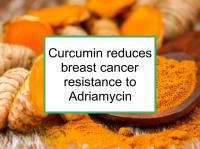A new study has described a mechanism of action by which curcumin reduces breast cancer resistance to treatment with doxorubicin. Curcumin, which has anti-inflammatory and anti-cancer properties, is the major biologically active component of the spice turmeric. Breast cancer cells can acquire resistance to chemotherapy.
This resistance is an important cause of breast cancer treatment failure. NFκB is a transcription factor known to be involved in a wide variety of cell pathways. Gene transcription is the process by which genetic information is copied from DNA to RNA.
This is followed by translation, in which the RNA is read and a specific protein is produced. Activation of NFκB, which creates a favorable environment for chemotherapeutic resistance, has been found in a variety of cancers. In particular, NFκB activation induces the production of several proteins involved in cell survival, countering the effects of tumor necrosis factor and other death-promoting proteins.
In the current study, the authors report details of their finding that doxorubicin results in a protective response in drug-resistant breast cancer cells. In addition, the authors show how pre-treatment of drug-resistant cells with curcumin can restore doxorubicin sensitivity to the cells.
Curcumin's known ability to reduce the systemic toxicity caused by doxorubicin might also enhance the efficacy of doxorubicin by improving the intrinsic defenses of breast cancer patients.
The authors note that the findings of this study clearly demonstrate the effectiveness of curcumin in combating doxorubicin resistance. They propose curcumin as a potent chemosensitizer to improve the effectiveness of this widely used anti-cancer drug.
Taken together, the authors conclude, the study results suggest that curcumin can be developed into an adjuvant chemotherapeutic drug.
Please see our articles on what to eat during doxorubicin or paclitaxel treatment for more information.
